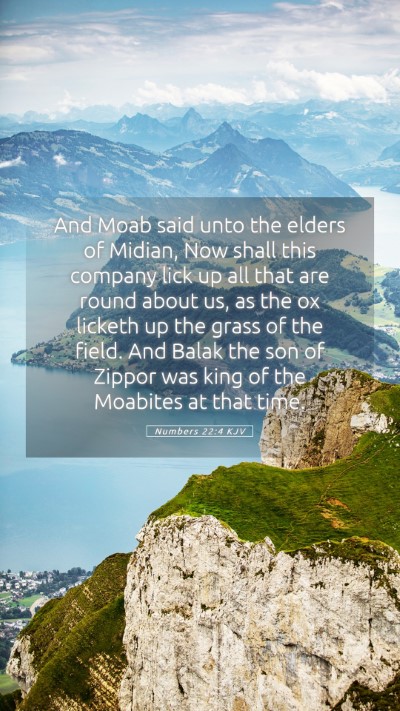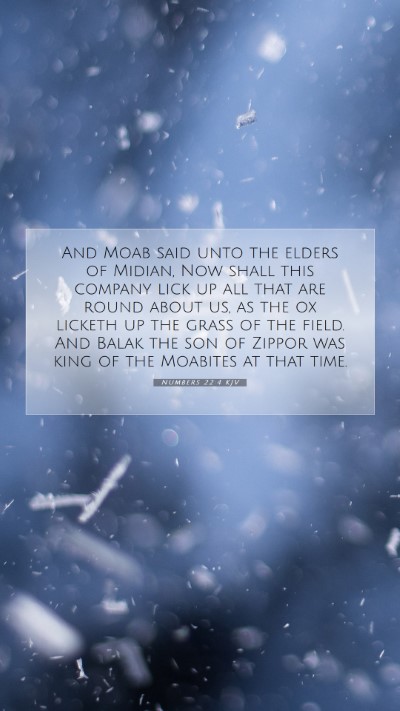Understanding Numbers 22:4
Numbers 22:4 states:
"And Moab said unto the elders of Midian, Now shall this company lick up all that are round about us, as the ox licketh up the grass of the field. And Balak the son of Zippor was king of the Moabites at that time."
This verse is situated in a narrative that explores the tensions between the Israelites and their neighboring nations as they prepare to enter the Promised Land. To fully grasp its meaning, we can refer to various public domain commentaries that expound upon its significance.
Overview of the Context
According to Matthew Henry, this chapter presents the fears of Balak, King of Moab, who is threatened by the advance of the Israelites. The mention of Balak consulting with the elders of Midian illustrates the collective anxiety of the surrounding nations in response to the Israelites' growing power. Balak's fear is rationalized as he perceives the Israelites as a significant threat, capable of devastating their land and resources.
Commentary Insights
- Fear of Conquest: Albert Barnes emphasizes that Balak's concerns reflect a natural fear of invasion. The metaphor of the ox licking up the grass symbolizes total consumption, which illustrates Van Balak's desperation to negotiate with the diviner Balaam to counter this perceived threat.
- Identity of Moab: Adam Clarke highlights the significance of Moab's identity. He notes that Moab is a descendant of Lot, and the historical animosities between the Moabites and the Israelites are paramount to the tension described in this passage. Clarke's analysis suggests a deeper historical trauma as Moab remembers the territorial conquests of Israel.
- Theological Implications: Henry comments on the theological implications of Moab's fear. It speaks to the providential protection of Israel by God, contrasting the Israelite's success and divine favor against the plight and conspiratorial strategies of their adversaries.
Applications and Lessons
Understanding Numbers 22:4 aids in grasping broader themes present in Scripture, such as:
- The response to perceived threats: Balak's fear highlights how individuals and communities often respond to looming threats with panic, leading to desperate measures.
- The role of divine providence: This verse captures the larger narrative of God's protection over His people, demonstrating that enemies may conspire against them, but God's purpose prevails.
- Importance of alliances: The engagement of Balak with Midian teaches about the importance of alliances and collaboration in countering perceived threats, which remain relevant in social and political contexts today.
Cross References
- Exodus 17:14-16: God's command to Moses to write in a book the memory of Amalek's aggression toward Israel, continuing the theme of ongoing conflict.
- Deuteronomy 2:9: The Lord's instruction not to distress Moab or contend against them — showing God's direct involvement in these nations' affairs.
- Joshua 24:9-10: The account of Balak hiring Balaam and God's intervention shows repeated themes of divine sovereignty over human affairs.
Conclusion
Numbers 22:4 serves as a pivotal insight into the fear and strategies of nations that oppose God's chosen people. The verse, when analyzed in-depth through the lenses of public domain commentaries such as those of Matthew Henry, Albert Barnes, and Adam Clarke, provides rich theological insights and applications for contemporary readers. This examination is foundational for those engaged in Bible study resources, offering comprehensive Bible verse explanations and enhancing the understanding of Scripture.


